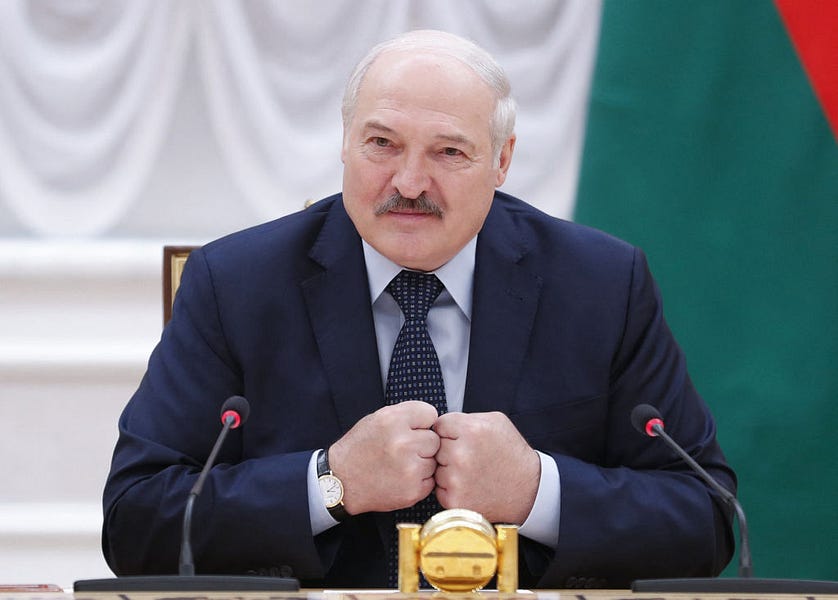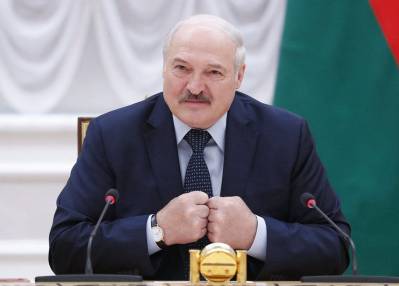Few observers were surprised last August when Belarusian President Alexander Lukashenko claimed he had won reelection to a sixth presidential term. As in previous elections, he had imprisoned his most formidable opponent, Sergei Tikhanovsky, and declared that he won more than 80 percent of the vote—this time against Svetlana Tikhanovskaya, Tikhanovsky’s wife, who ran in his place. Months of protests followed and thousands were arrested, with at least four detainees dying in prison.
Now, after a brazen move by Lukashenko, there is renewed international focus on his regime. Last month, he ordered a military jet to escort a commercial airliner—flying through Belarusian airspace, bound for Lithuania—to Minsk. The Ryanair flight was carrying opposition journalist Roman Protasevich, who was arrested along with his girlfriend.
Dubbed “Europe’s last dictator,” how has Lukashenko maintained his grip over the country for almost 30 years?
His rise began almost immediately upon the end of the Cold War. On December 24, 1991, Soviet Prime Minister Mikhail Gorbachev proclaimed “we’re now living in a new world,” and announced the dissolution of the Soviet Union. Lukashenko was the only member of the Belarusian SSR parliament to oppose the agreement. Since the fall of the USSR, Belarus has remained the most staunchly “Soviet” of the former republics, with its leadership adopting repressive tactics in every election since 1994. Indeed, a 2008 New York Times piece described the country “as a museum-quality relic of the Soviet Union.”
An army veteran, academic, political organizer, and farm collective manager, Lukashenko created a parliamentary faction called “Communists for Democracy” in 1991, maintaining strong ties between conservative communist groups in Belarus and Russia. That led to a run for the presidency. During his campaign, Lukashenko proclaimed his populist agenda to the New York Times, stating: “I am neither with the leftists nor the rightists, but with the people against those who rob and deceive them.”
On July 10, 1994, Lukashenko was elected the first president of the Republic of Belarus, purportedly earning 80.3 percent of the votes in the second round of the election. He’s never left office since. And in every election since, Lukashenko has claimed to have won between 75 and 85 percent of the votes.
In 1996, Lukashenko boasted that 70.5 percent of his constituents supported changes he had proposed to the constitution. The referendum granted Lukashenko the power to unilaterally appoint one third of the seats in parliament, rule through executive orders, and extend his time in office. Some parliamentary leaders sought to impeach him; the speaker of parliament, Semyon Sharetsky, called the referendum a farce. In 1999, when Lukashenko’s first term as president would have ended if not for the 1996 referendum, some members of parliament coined Sharetsky the acting president. Under the former Belarusian constitution, the speaker had been empowered to fill a presidential vacancy until an election was held. Lukashenko claimed his first five-year term as president began with the new constitution in 1996, suggesting his first term would end in 2001. Meanwhile, Sharetsky fled to Lithuania during government crackdowns against the opposition.
In 2000, the U.S. Congress responded with a resolution condemning Lukashenko’s regime for violations of human and political rights. The resolution implored Lukashenko to protect human rights and reinstate the democratically elected government and called on the president of the United States to support Belarusian opposition, referring to the “illegitimate nature of the Lukashenka regime.”
Over the next two decades, Lukashenko ran his country like a Soviet republic, adopting a take on the Soviet flag, solidifying Russian as the primary language, suppressing the press, as well as threatening and imprisoning his opposition. Lukashenko ended the minimal market privatization that Belarus started following independence. Every election since 1994 has been marred with claims of fraud.
In 2001, under the threat of free and fair elections, Lukashenko showed the world his intentions. The European Union, Russia, and the United States publicly insisted on a free campaign. Russian television networks broadcasted accusations of Lukashenko’s corruption into Belarus, bypassing censored, state-controlled, networks. Despite these efforts, Lukashenko’s government effectively blocked opposition parties from propagating information around the country. Lukashenko claimed 81 percent of the votes, while early projections suggested he would take some 61 percent.
In 2004, midway through Lukashenko’s second term, he preemptively held a referendum to allow himself to run for additional presidential terms. Before the polls closed, he had already claimed victory. When Lukashenko proceeded to win a third term in 2006, the European Union and United States both denounced the election as fraudulent.
In 2008 the U.S. imposed sanctions on “top state-owned businesses and senior officials” for worsening human rights abuses. After the sanctions were announced, Lukashenko demanded significant reduction in the size of the U.S. Embassy, eventually expelling U.S. Ambassador Karen B. Stewart back to Washington. The post remains empty, with only a small corps of diplomats supporting the embassy in Minsk.
During the election process in 2010, Lukashenko relaxed some of the most blatant previous forms of corruption. A few opposition candidates were allowed to hold rallies and disseminate materials, and candidates held televised debates (without Lukashenko). Despite these small nods toward liberalization, seven of nine opposition candidates were arrested. Lukashenko’s declaration of victory, with just under 80 percent of the vote, was once again met with skepticism from international election monitors.
During the 2015 election, Lukashenko did not even bother with the illusion of liberalization. Not a single opposition candidate was allowed to register. With Lukashenko claiming 83.5 percent of the vote, and a turnout of 87 percent, the Organization for Security and Co-operation in Europe (OSCE) alleged gross election mismanagement and outright corruption.
Throughout his political career, Lukashenko has sought to defend Belarus from what he describes as the decadence and corruption of the West. Lukashenko’s preferred title, “Batka,” actually means “father” or “dad.” But in the last year, Lukashenko’s tough-love image has been undermined by massive protests in the country, which have exposed his deep political vulnerability.
Last May, thousands of people rallied in the Belarusian capital of Minsk to protest Lukashenko’s bid for a sixth term in office. Led by opposition candidate and blogger Sergei Tikhanovsky, the protests were inspired by a new crackdown on journalists ahead of the August elections and Lukashenko’s dismissive attitude toward the COVID-19 pandemic.
While many European countries imposed strict quarantine measures to combat the spread of COVID-19, Lukashenko refused to take any action in Belarus. When confronted about his position in April, the Belarusian president claimed “no one would die” of coronavirus within the country, and he later mocked a reporter, asking whether she could “see any viruses flying around” at a packed hockey stadium.
As the world’s scientists struggled to find ways to slow COVID-19 transmission, Lukashenko offered a much simpler diagnosis—drink vodka and visit the sauna.
For many Belarusians tired of Lukashenko’s leadership style, this was the final straw. In a June 2020 interview with Reuters, Viktor Babariko, the head of a local bank and another opposition candidate to Lukashenko, explained: “Everyone understands that our notorious stability is no longer stability. This stability is like that of a cemetery. The behavior of the authorities during the coronavirus pandemic period was the last trigger that showed complete disrespect.”
In an attempt to clamp down on his opposition, Lukashenko arrested both Babariko and Tikhanovksy, accusing the former of plotting to destabilize Belarus and the latter of being a foreign agent. Shortly after, Tikhanovsky’s wife, Svetlana Tikhanovskaya, joined the presidential race in order to continue her husband’s advocacy.
Despite Lukashenko’s claim that the burden of the presidency would cause a woman to “collapse, poor thing,” Tikhanovskaya quickly became the new face of the Belarusian opposition movement, calling for the liberation of all political prisoners in the country. Over the course of the summer, street protests against Lukashenko became increasingly frequent, as Lukashenko emphasized that he would prevent any “color revolutions” from threatening his administration, a reference to a series of revolutions in the Balkans in the early 2000s.
On August 9, state Belarusian television claimed that Lukashenko had won the election against Tikhanovskaya with—once again—more than 80 percent of the vote, a victory so large that even the president’s supporters doubted its authenticity. Later that night, Tikhanovskaya supporters crowded the streets in all major Belarusian cities, including Minsk, Grodno, Brest, Gomel, and Vitebsk, calling for a fair count of the votes. Conflicts quickly broke out between protesters and authorities, with police using crowd control weapons and vehicles to quell the unrest. By the next morning, security forces had arrested around 3,000 people, including some who were simply waiting for election results near their polling stations.
Shortly after the election, Tikhanovskaya published a video on YouTube saying that she had left Belarus for Lithuania, a decision she made “for the sake of her children.”
Even with Tikhanovskaya absent, protests continued throughout the fall and spring, with many attracting hundreds of thousands of people. In the “March of Unity” in Minsk on September 6, for example, an estimated 200,000 people turned out to demand Lukashenko’s resignation, many of whom were reportedly subjected to tear gas and detentions by police.
The continued energy behind the Belarus protests was in large part due to two channels on the messaging app Telegram, Nexta and Nexta Live, which became a hub for people within the opposition to exchange information and plan events. Unlike official media channels within Belarus, Telegram provided an uncensored way for people to share their experiences, since it was encrypted and often worked even during internet blackouts.
Lukashenko’s audacious move to arrest Roman Protasevich has turned Belarus’ domestic political situation into an international issue, with the U.S. and European nations issuing fierce criticism and taking steps to isolate Lukashenko, while Putin has defended him.
The question for people in Belarus is now simple: What comes next? Lukashenko has shown little willingness to step down or negotiate with the opposition, but with escalating internal and international pressure on his regime, Lukashenko may have no choice but to accept protesters’ demands for new elections.







Please note that we at The Dispatch hold ourselves, our work, and our commenters to a higher standard than other places on the internet. We welcome comments that foster genuine debate or discussion—including comments critical of us or our work—but responses that include ad hominem attacks on fellow Dispatch members or are intended to stoke fear and anger may be moderated.
With your membership, you only have the ability to comment on The Morning Dispatch articles. Consider upgrading to join the conversation everywhere.